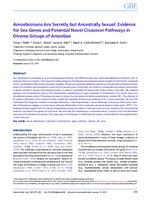- Collection:
- Spelman College Faculty Publications
- Title:
- Amoebozoans Are Secretly but Ancestrally Sexual: Evidence for Sex Genes and Potential Novel Crossover Pathways in Diverse Groups of Amoebae
- Creator:
- Tekle, Yonas I., Spelman College
Wood, Fiona C., Spelman College
Katz, Laura A., Smith College,University of Massachusetts
Cero n-Romero, Mario A., Smith College,University of Massachusetts
Gorfu, Lydia A., Spelman College - Date of Original:
- 2017
- Subject:
- Spelman College--Faculty
African American scholars
African Americans--Education (Higher)--Georgia
African American universities and colleges--Georgia--Atlanta - Location:
- United States, Georgia, Atlanta Metropolitan Area, 33.8498, 84.4383
- Medium:
- articles
- Type:
- Text
- Format:
- application/pdf
- Description:
- Sex is beneficial in eukaryotes as it can increase genetic diversity, reshuffle their genomes, and purge deleterious mutations. Yet, its evolution remains amystery. The eukaryotic clade supergroup Amoebozoa encompasses diverse lineages of polymorphic amoeboid forms, including both free-living and parasitic lineages. The group is generally believed to be asexual, though recent studies show that someof itsmembers are implicated in cryptic forms of sexual cycles. In this study,weconduct a comprehensive inventory and analysis of genes involved in meiosis and related processes, in order to investigate the evolutionary history of sex in the clade. We analyzed genomic and transcriptomic data of 39 amoebozoans representing all major subclades of Amoebozoa. Our results show that Amoebozoa possess most of the genes exclusive to meiosis but lack genes encoding synaptonemal complex (SC). The absence of SC genes is discussed in the context of earlier studies that reported ultrastructural evidence of SC in some amoebae. We also find interclade and intrageneric variation in sex gene distribution, indicating diversity in sexual pathways in the group. Particularly, members of Mycetozoa engage in a novel sexual pathway independent of the universally conserved meiosis initiator gene, SPO11. Our findings strongly suggest that not only do amoebozoans possess sex genes in their genomes, but also, based on the transcriptome evidence, the present sex genes are functional.We conclude that Amoebozoa is ancestrally sexual, contrary to the long held belief that most of itsmembers are asexual. Thus, asexuality inAmoebozoa, if confirmed to be present, is a derived-trait that appeared later in their evolution. KEYWORDS: sexual reproduction, genome, transcriptome, gene inventory, meiosis, life cycle
- External Identifiers:
- Metadata URL:
- http://hdl.handle.net/20.500.12322/sc.fac.pubs:2017_tekle_yonas
- Original Collection:
- Genome Biology and Evolution 9, no. 2 (2017): 375-387
- Holding Institution:
- Spelman College
- Rights:
-
